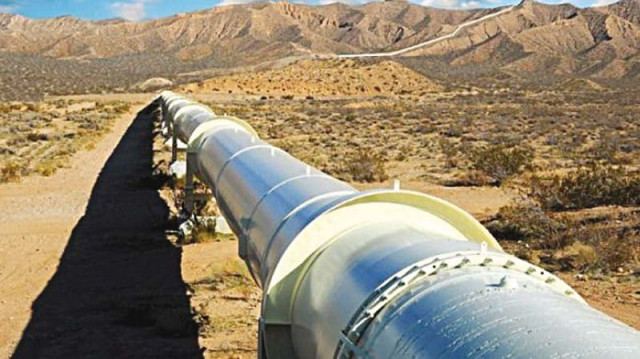After Iran deal: Wrangling intensifies over gas pipelines in Pakistan
Country set to make good on promise to finish the IP pipeline, says Abbasi

Tehran has already built its part of the 1,800-kilometre pipeline which should eventually link its South Pars gasfields to the city of Nawabshah. PHOTO: FILE
A landmark deal on Iran’s nuclear programme has breathed new life into plans for a gas pipeline through Pakistan and sparked a geopolitical tussle, with Russia looking to expand its influence, observers say.
With sanctions on Iran likely to ease and peace talks between the Taliban and Afghan government getting under way, wrangling is intensifying over the proposed pipelines, which would link Central Asia to the Middle East.
Pakistan is desperate for solutions to a long-running power crisis that has sapped economic growth and left people fuming over incessant electricity cuts.
The $7.5-billion Iran-Pakistan (IP) pipeline was inaugurated with great fanfare in March 2013, but the project immediately hit quicksand in the form of international sanctions on Tehran, which meant Pakistan struggled to raise the money to build its side.
Minister of Petroleum and Natural Resources Shahid Khaqan Abbasi said the Vienna deal should allow Islamabad to make good on its agreement to finish the pipeline and buy Iranian gas.
“Now hopefully, as the sanctions are removed, it facilitates us to address our energy needs and also meet the contractual obligation,” he told AFP.
Tehran has already built its part of the 1,800-kilometre pipeline which should eventually link its South Pars gasfields to the city of Nawabshah.

As part of an ambitious $46-billion economic corridor linking western China to the Middle East through Pakistan, Beijing recently started work on the section of the pipeline between Nawabshah and Gwadar port, close to the Iranian border.
Once this is completed, Pakistan will build the last 80 km to Iran - before the 2018 general election - and it could in future extend the connection northeast to China, according to government sources.
Russia is interested in supporting the IP pipeline through energy giant Gazprom, according to the Russian embassy in Islamabad.
Moscow has historically had closer relations with India, but is pivoting more to Islamabad as New Delhi and Washington become closer allies.
Yury Barmin, an analyst specialising in Russia’s Middle East policy, said by using the IP pipeline to get closer to Pakistan, Moscow wanted to show India it had other options in the region.
“At the same time, Russia really wants to explore commercial opportunities for its defence industry in the wider MENA (Middle East) region and Pakistan is probably the only remaining untapped market in that sense,” Barmin said. Islamabad and Moscow signed a defence cooperation agreement in November last year.
The two countries are also close to finalising an agreement to build a gas pipeline linking Karachi, which has an LNG terminal, to Lahore, said Mobin Saulat, CEO of Inter-state Gas Systems, a publicly-owned company.
Saulat said these moves meant that the Turkmenistan-Afghanistan-Pakistan-India pipeline (Tapi), an even more ambitious project, would likely take a back seat for now.
“LNG is happening already, we have the supply in place, the happening of IP with the latest development is of course next. And Tapi, in the list, will come at the end,” he said.
Tapi, valued at up to $10 billion, would pump gas from Turkmenistan to Pakistan and India, through Afghanistan.
Published in The Express Tribune, July 24th, 2015.
Like Business on Facebook, follow @TribuneBiz on Twitter to stay informed and join in the conversation.



















COMMENTS
Comments are moderated and generally will be posted if they are on-topic and not abusive.
For more information, please see our Comments FAQ